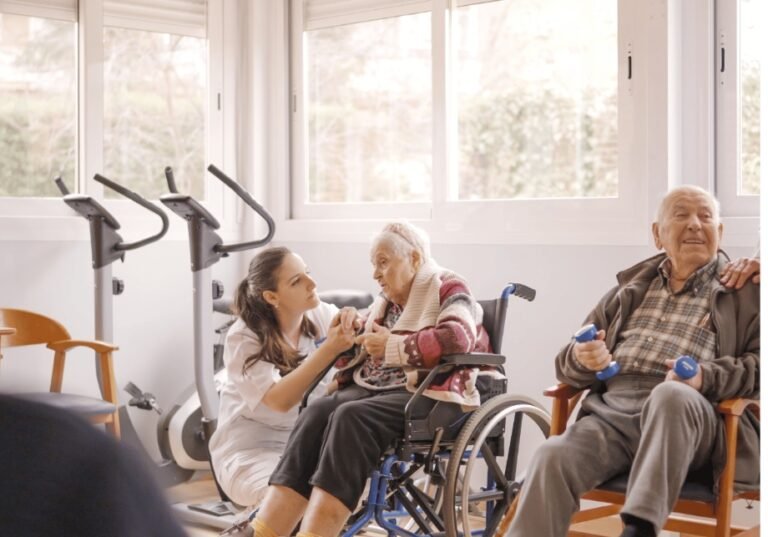As the global population ages, the demand for personalized and accessible healthcare solutions has surged. One such solution gaining popularity is the combination of aged care services with at-home physiotherapy. This approach not only ensures that elderly individuals receive the necessary medical attention but also enhances their overall quality of life within the comfort of their homes.
The Importance of Aged Care Services
As societies worldwide continue to age, the demand for quality aged care services has never been more critical. Aged care services play a pivotal role in ensuring the elderly population lives with dignity, comfort, and purpose. These services not only address basic needs but also promote holistic well-being, supporting physical, mental, and emotional health. Here are key reasons why aged care services are indispensable:
1. Promoting Independence
Aged care services empower older adults to maintain a degree of independence by providing tailored assistance. Whether through help with daily tasks, mobility support, or home modifications, these services enable individuals to live in familiar surroundings for as long as possible.
2. Ensuring Health and Safety
Older adults often face health challenges, such as chronic conditions, reduced mobility, or cognitive impairments. Aged care professionals provide essential medical support, physiotherapy, and monitoring to prevent accidents and manage health conditions, significantly enhancing safety and quality of life.
3. Enhancing Quality of Life
Access to recreational activities, social programs, and companionship through aged care services reduces isolation and improves mental health. These services foster a sense of community and engagement, helping seniors enjoy their golden years.
4. Supporting Family Caregivers
Family members may feel overburdened when providing care for an elderly loved one. Aged care services provide much-needed respite, professional guidance, and support, alleviating stress and ensuring seniors receive expert care.
5. Offering Specialized Care
For those with specific needs, such as dementia or palliative care, aged care services provide specialized programs and trained professionals who understand the complexities of these conditions.
6. Physiotherapy at Home
Physiotherapy at home is a growing trend within aged care, offering tailored rehabilitation and exercise programs. This approach is convenient and beneficial for mobility improvement, pain management, and recovery from surgeries or injuries, all within the comfort of one’s home.
The Role of Physiotherapy in Aged Care
Physiotherapy plays a crucial role in helping seniors maintain mobility, manage pain, and recover from injuries or surgeries. The benefits of physiotherapy for the elderly include:
- Improved mobility and balance: Reducing the risk of falls and improving confidence in movement.
- Pain management: Alleviating discomfort from conditions such as arthritis or osteoporosis.
- Post-surgery rehabilitation: Assisting in the recovery process after surgeries like hip or knee replacements.
- Enhanced cardiovascular health: Promoting exercises that improve heart health and overall stamina.
Benefits of Physiotherapy at Home
Offering physiotherapy services at home is a game-changer for elderly individuals, providing numerous advantages:
- Convenience and Comfort
Seniors can receive treatment without the need to travel, which can be challenging and stressful. - Personalized Care
Home physiotherapy sessions are tailored to the individual’s specific needs, ensuring more effective results. - Familiar Environment
Being in a familiar setting helps reduce anxiety and encourages better participation in therapy. - Family Involvement
Family members can observe and participate in the care process, fostering a supportive environment.
How to Access At-Home Physiotherapy Services
Physiotherapy is vital for improving mobility, managing pain, and enhancing recovery, especially for seniors or individuals with limited mobility. At-home physiotherapy services bring professional care directly to the comfort of your home, making it more convenient and accessible. Here’s a step-by-step guide on how to access at-home physiotherapy services:
1. Assess Your Needs
Determine the reason for seeking physiotherapy services. Common conditions include:
- Post-surgical recovery
- Chronic pain (e.g., arthritis or back pain)
- Neurological conditions (e.g., stroke rehabilitation)
- Mobility challenges
Understanding your needs will help you find a physiotherapist specializing in your required care.
2. Consult Your Doctor
Speak with your general practitioner (GP) or a healthcare professional to get a referral. They can recommend trusted physiotherapists or agencies that provide home services. A referral may also be required for insurance claims.
3. Research Providers
Search for physiotherapy providers in your area that offer home visits. Look for:
- Reviews and testimonials
- Credentials and certifications
- Specialized services for your condition
Some aged care organizations and physiotherapy clinics have dedicated at-home services.
4. Verify Coverage and Costs
Check whether your health insurance, government programs (e.g., NDIS in Australia or Medicare), or aged care packages cover at-home physiotherapy. If paying out-of-pocket, inquire about costs upfront to avoid surprises.
5. Schedule an Initial Assessment
Book an initial appointment where the physiotherapist will evaluate your condition, discuss your goals, and create a personalized treatment plan. This assessment often includes:
- Reviewing medical history
- Physical examination
- Goal setting
6. Prepare for Sessions
Make your home environment conducive to physiotherapy sessions by:
- Clearing sufficient space for exercises
- Ensuring good lighting and ventilation
- Having basic equipment ready if needed (e.g., yoga mats or resistance bands)
7. Engage in Regular Sessions
Consistency is key to achieving results. Follow the treatment plan and actively engage in exercises or techniques recommended by your physiotherapist.
8. Monitor Progress
Work with your physiotherapist to track improvements and make adjustments to the program as needed. Frequent feedback guarantees that the therapy stays successful and in line with your objectives.
Conclusion
Combining aged care services with physiotherapy at home creates a holistic care approach that supports the physical and emotional well-being of elderly individuals. Aged care services are more than a necessity; they are a cornerstone of a compassionate society. By addressing the diverse needs of seniors, these services ensure that aging is not a burden but a dignified and enriching stage of life. Investing in aged care is an investment in the health and happiness of our communities. It enables individuals to continue being independent while getting the care they require in a location that suits them best. Whether recovering from an injury, managing a chronic condition, or simply aiming to stay active, this integrated approach can significantly enhance the quality of life for seniors.
Passionate content writer and savvy blog publisher, Aamir crafts compelling stories and insightful articles that captivate and inform. With a knack for blending creativity and strategy, they bring fresh perspectives to every piece. Dive into their world of words and discover content that resonates.





